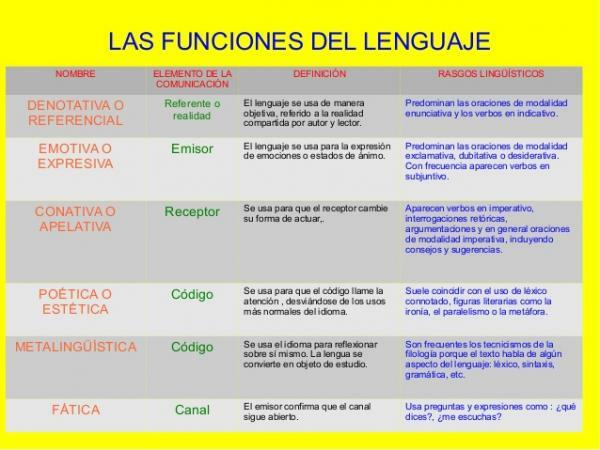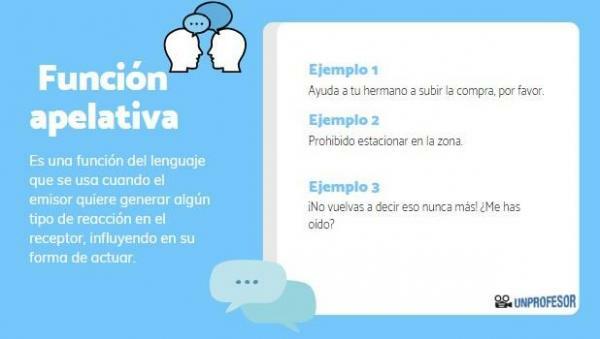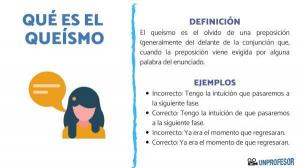CHARACTERISTICS of the APPEAL function of the language

Language, as the main communication tool we use, is distinguished by having different functions: emotional or expressive, referential, poetic, metalinguistic, appellative, etc. Each of them establishes a relationship between the speaker (sender) and the listener (receiver), since the message will have a different intention depending on the function it is fulfilling. In this lesson from a teacher we will delve, punctually to know the characteristics appellative function of language with some examples.
Index
- Language elements
- Language functions: easy definition
- Characteristics of the most outstanding appellate function
- Examples of the appellative function of language
- Where is the appeal function used?
Elements of language.
First of all, in order to understand the appellative function of language, let us briefly recall what are its elements:
- Transmitter: He is the one who delivers the message, that is, he is the one who speaks or generates the communication.
- Receiver: is the one who receives the message.
- Channel: It is the means by which the sender delivers the message to the receiver. The qualities of the channel will determine if the communication is unilateral (that the receiver cannot respond to the sender, such as in books or television) or if it is bidirectional (where the receiver can respond to the sender, as in a talk of friends).
- Code: it is the signs that we use to convey the message, it is the language, so to speak, that we use. We encode our message through languages, images, symbols, etc.
- Context: It refers to the specific time and space in which the communicative act takes place. It can also refer to the cultural and social factors that shape and affect communication.
These are the main elements that make up the language and it is through them that their different functions can be used. It is worth remembering that the relationship between these will determine the type of communication that is used. Likewise, the type of function will affect the behavior of the sender and receiver.

Image: Slideshare
Language functions: easy definition.
In order to understand the appellate function we must understand what they are language functions. While the main purpose of language is to communicate, depending on the type of message we want to transmit we will use certain resources. This is how the following functions emerge:
- Referential or informative function: seeks to transmit knowledge, provide information with descriptions and definitions.
- Emotional or expressive function: concentrates on conveying feelings or moods.
- Poetic function: it has an aesthetic goal of embellishing language.
- Metalinguistic function: it is used to refer to the language itself.
In the case of appellate function Now let's see what happens specifically when we use it.

Characteristics of the most outstanding appellate function.
Now, in the specific case of the appellate function, we refer to a use of language in which the sender wants the receiver to take an attitude or perform an action according to the content and the form of the message that the same issuer is giving.
In other words, the appellate function consists of give a mandate, in influencing the behavior of the person who is listening to our message. To achieve this, imperative sentences are used.
In line with the aforementioned, imperative sentences are those that exhort another person to do something. They use verbs imperatively, for example: Buy the food. These sentences are usually accompanied by exclamation marks to provide strength and increase its expressiveness.
We could summarize the characteristics of the appellative function of language in the following four points:
- The issuer seeks to have a impact on the listener.
- Alter the message tone, which often translates into exclamation marks.
- The purpose of the function is that the issuer act.
- Employ imperative sentences to develop its appeal function.

Examples of the appellative function of language.
Throughout this lesson from a Professor we have seen what the appellate function consists of and what its characteristics are. Then, we will present you a series of examples so that you recognize these qualities.
- No Smoking.
- Come here!
- Young people, be quiet.
- Look at the sky!
- Be careful when leaving.
- Shower before entering the pool.
- Forbidden to eat.
- Juan, stop making that noise.
- Answer your mother.
- Run!
- Pick up your dog's poop.
- Put trash where it belongs.
- Diana, when she leaves, turns off the light.
Where is the appeal function used?
As you may have noticed in the previous examples, the appealing function of language is not only used in conversations. These can be in street signs, traffic signs, restaurant messages, hotels, we can also find them on television or even on the radio. In this sense, imperative sentences are used in both oral and written media.
If you want to read more articles similar to Characteristics of the appellate function, we recommend that you enter our category of Grammar and Linguistics.
Bibliography
- Antonio, C. (2015). Language functions and forms.
- Cortex. Vega, H. Pariona, J. (2009). Natural language processing. Peru: Major National University of San Marcos.
- Martinez, A. (1990). Language functions and communicative functions in the teaching of Spanish.
- Vargas, E. (2015). The functions of language.



